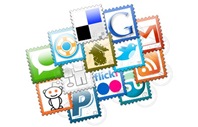5 ways social media has changed PR
In celebration of Social Media Day today, we decided to take a retrospective look at some of the ways social media has had an impact on the public relations industry. Not only has it changed the way we communicate with each other, but as it gains acceptance and usage among executives, it will play an increasingly-important role in our scope of work on a daily basis as PR professionals.
According to a report from eMarketer, a whopping 63.7 percent of internet users in the U.S. will use social networks in 2011, creating quite the desirable pool of prospective customers (and advocates, ideally). The firm also reported estimates that four in five U.S. businesses (with at least 100 employees) will take part in some sort of social media marketing this year, up from just 42 percent as recently as 2008. This number is expected to continue to rise, especially in light of related surveys that have revealed that as much as 63 percent of small businesses feel as though social networking makes a “significant” impact on their sales and revenue.
So what does this mean for us? Well, not only has social media infiltrated nearly every industry, but PR pros will be expected to ramp up their strategies in order to best engage audiences using the social web. And as much as the occasional rogue Facebook post or off-color Twitter rant from the public can keep us up at night, we’ll be seeking to embrace this form of communication more and more as a mechanism for not only sharing information with key audiences, but also listening to and connecting with them like never before.
Read on for our take on how social has already made its mark on PR:
- It’s a two-way street – Not that jumping on your soapbox and simply blasting a message via megaphone was ever effective, but now more so than ever, PR practitioners are connecting with audiences on a human level and inviting conversation. Receiving this invaluable feedback allows for real-time refinement of strategies and tactics, making brand connections with consumers and constituents that much deeper.
- 24/7 Engagement – Gone is the traditional 9-to-5 schedule because social media conversations never stop. Now that consumers can connect directly with a brand at any time, it’s up to us as PR pros to play host or hostess at the party, keeping the conversation going, encouraging a good back-and-forth and making new introductions to facilitate constant – and consistent – engagement.
- Increased demand for digital Pros – Forget about ‘keeping up with the Joneses’…if you’re in PR, you’re more concerned about keeping up with the latest Facebook feature or location-based app. The advent of social media has shown us that the most successful (and in-demand) PR people aren’t afraid to explore and embrace new technologies, continually adding all sorts of new technologies to their repertoire.
- Navigating the new landscape – As this article in Mashable points out, social media has blurred the line between paid, earned and owned media – not only altering their definitions, but also posing the PR challenge about how to integrate all three forms for the greatest success. By focusing on a balanced mix, PR professionals can help spread customer touch points across all functions within a company, and it’s this new approach that will have the greatest lasting impact.
- Evolving definition of success – Yes, some of us may have entered PR thinking it was the furthest field from anything math-related, but the fact remains that metrics have been – and continue to be – a PR pro’s best friend. And thanks to social media, we’re continually redefining the measure of success: Whether it’s friends on Facebook or daily of Tweets, we know that quality reigns over quantity, and that a long-term approach garners the most powerful return on investment when it comes to making connections.
What else would you add about how social media has changed the PR industry, and how do you expect it will further change our industry in the future?
The staff here at PerkettPR is also having some fun on Social Media Day by creating a series of videos explaining how Social Media has changed each of our lives and/or what our favorite social media tools are. We will be posting them to the PerkettPR Facebook page throughout the day, so be sure to check them out and leave us a comment!


 When CareerCast posted a list of the
When CareerCast posted a list of the